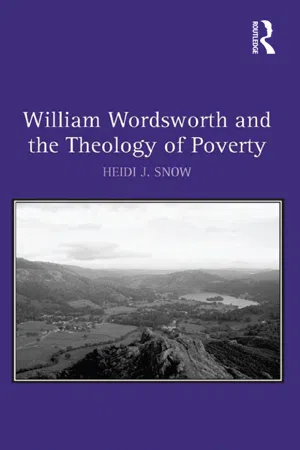
- 160 pages
- English
- ePUB (mobile friendly)
- Available on iOS & Android
William Wordsworth and the Theology of Poverty
About This Book
Exploring the relationship between poverty and religion in William Wordsworth's poetry, Heidi J. Snow challenges the traditional view that the poet's early years were primarily irreligious. She argues that this idea, based on the equation of Christianity with Anglicanism, discounts the richly varied theological landscape of Wordsworth's youth. Reading Wordsworth's poetry in the context of the diversity of theological views represented in his milieu, Snow shows that poems like The Excursion reject Anglican orthodoxy in favor of a meld of Quaker, Methodist, and deist theologies. Rather than support a narrative of Wordsworth's life as a journey from atheism to orthodoxy or even from radicalism to conservatism, therefore, Wordsworth's body of work consistently makes a case for a sensitive approach to the problem of the poor that relies on a multifaceted theological perspective. To reconstruct the religious context in which Wordsworth wrote in its complexity, Snow makes extensive use of the materials in the record offices of the Lake District and the religious sermons and congregational records for the orthodox Anglican, evangelical Anglican, Methodist, and Quaker congregations. Snow's depiction of the multiple religious traditions in the Lake District complicates our understanding of Wordsworth's theological influences and his views on the poor.
Frequently asked questions
Information
Chapter 1 Identifying and Identifying with the Poor
Pedlar, The, (read, 24; in good spirits about, 50; ill with altering, 58; and tired with, 60,61, 62, 63; got to some ugly places, 65; worn out, D also, 67; W the worse for work, 70; disaster, 73; D re-writes, 74–5; read over and altered, 76; read to C, 81; arranged, D writes out, 280 lines of it, 118).
First, the poor were the destitute whose needs for discipline and sustenance were to be addressed either by voluntary donation or through statutory provision…. Second, the poor were a more general category of labourers toiling to create the nation’s wealth. This double definition overlay a tenacious belief in inherited status which underpinned the concept of the genteel poor, those unable to live according to the expectations of their rank. And it tended to supersede a long-established Christian tradition, reasserted by John Wesley, that the poor formed a spiritual category, closer to salvation than the rich and respectable. (115)
£100 a year: this is the lowest income that can support the price of a ticket to a circulating library. It embraces poor curates, clerks in government office (both only marginally genteel), and moderately prosperous tradesmen. It could supply a family only with a young maid servant, and at a very low wage. (135)
and on my account that it will greatly contribute to my happiness & place me in such a situation that I shall be doing something, it is a painful idea that one’s existence is of very little use which I really have always been obliged to feel; above all it is painful when one is living upon the bounty of one’s friends a resource of which misfortune may deprive one & then how irksome & difficult is it to find out other means of support, the mind is then unfitted, perhaps for any new exertions & continues always in a state of dependence, perhaps attended with poverty. (WLL / Wordsworth, W and D / 1 / 38, her emphasis)
With sixty pounds a year I should not fear any accidents or changes which might befal me. I cannot look forward to the time when, with my habits of frugality, I could not live comfortably on that sum (Observe I am speaking now, of a provision or settlement for life, and it would be absurd at my age (30 years) to talk of any thing else). At present with 60 pounds per ann. I should have some...
Table of contents
- Cover Page
- Half Title Page
- Dedication Page
- Title Page
- Copyright Page
- Table of Contents
- Preface
- Introduction
- 1 Identifying and Identifying with the Poor
- 2 Cockermouth and the Anglican Orthodox Poor System
- 3 An Evangelical Perspective: Wordsworth and the Problem of Suffering
- 4 Quakers and the Poor
- 5 The Excursion and the Compassionate Community
- Appendix
- Bibliography
- Index